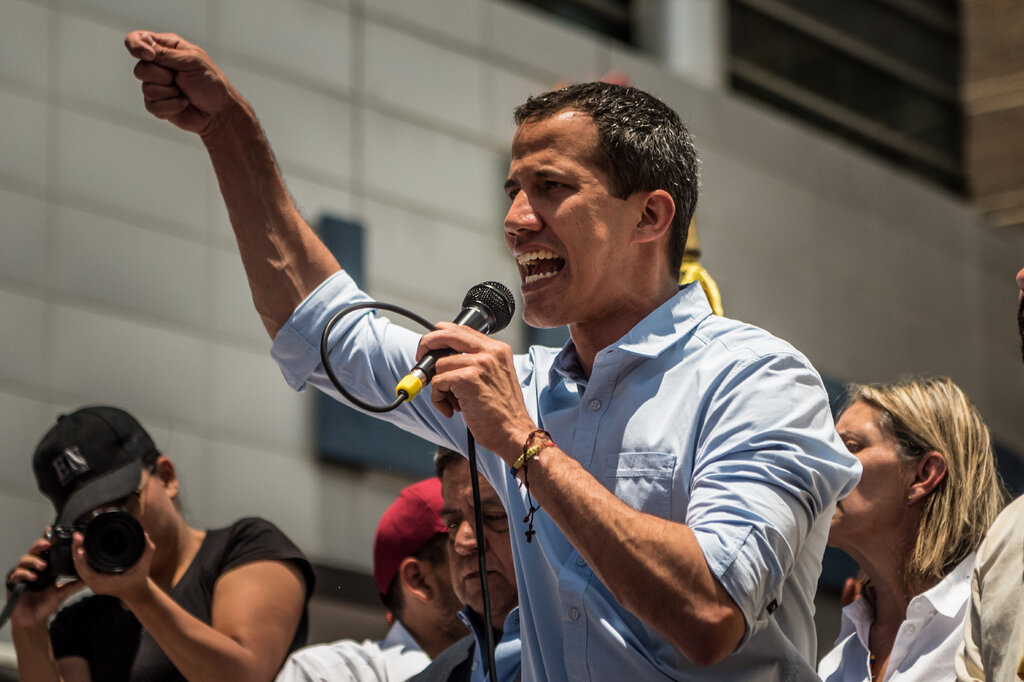In a vote held by the opposition legislature that exists parallel to Mr. Maduro’s government, Mr. Guaidó’s own colleagues voted overwhelmingly to end his interim government.
A total of 72 representatives voted Thursday to eliminate the interim government, while 24 voted to keep it and nine voted to abstain.
In a message to the public, the three opposition political parties supporting the end of the interim government said that the “political process” that began four years ago with the recognition of Mr. Guaidó as president “is not perceived as an option for real political change.”
The strategy in place under Mr. Guaidó “has not reached the expected liberation objectives and the country demands new paths that lead us toward democracy,” the message continued.
It was also a blow to the United States, which threw its support steadfastly behind Mr. Guaidó and continues to refer to him the country’s interim president, even as other nations have backed away from that recognition.
Since then, the opposition has succeeded in getting Mr. Maduro to agree to a political dialogue in Mexico, which is set to continue next month after being stalled for more than a year.
As a part of those talks, Mr. Maduro has agreed to allow some Venezuelan funds frozen abroad to be used as humanitarian aid to help alleviate hunger and other travails faced by the country.
While this is regarded as a concession, the opposition is still far from its ultimate goal: Mr. Maduro’s removal. Opposition leaders are pushing him toward allowing free and fair conditions for a presidential election that is already scheduled in 2024.
Mr. Guaidó’s "strength" in recent years rested with his diplomatic recognition from the United States and its allies, but American sanctions designed to assist him have gutted government revenues and forced citizens to focus on daily survival, not political mobilization.
His attempts to trigger a military uprising ended up, instead, consolidating Mr. Maduro’s control of the armed forces.
“The opposition is taking stock of where it stands and realizing that the interim government experiment didn’t pan out,” said Geoff Ramsey, the director for Venezuela at WOLA, a Washington-based advocacy organization.
He added that the interim government has increasingly become less relevant in Caracas the capital, and more relevant in Washington. “I think over time the interim government outlived its usefulness and that’s why we’re seeing the Venezuelan opposition looking for new ways to restructure itself,” he said.
The administrations of several new leftist governments in South America have also begun to soften their approach toward Mr. Maduro.
Bolivia resumed normal relations with Venezuela after the election of Luis Arce in 2020. Peru did the same last year following the election of Pedro Castillo, who was ousted this month after he tried to dissolve the Peruvian Congress. Earlier this year, President Alberto Fernández of Argentina said he would follow a similar path.
Most recently Gustavo Petro, the newly elected leftist president of Colombia, a nation that for years has been the strongest ally of the United States in Latin America, re-established diplomatic relations and trade with Mr. Maduro’s government, marking a new chapter in the global approach with Venezuela.
A representative of the U.S. Embassy to Venezuela did not immediately respond to a request for comment. :guaido-despair:


Tfw your landowner and petite bourgeois interest groups realign their ideologies and you can finally get some work done
deleted by creator
I played with no tutorial
it's an easy game tbh
Me just eternally waiting to get anything done in the game because for some reason none of my interest groups ever get a good ideology.
My trade unions group went fascist for like 40 years and I have no idea why.
Yeah idk I usually just do whatever reforms help at first, then disempower the landowners and just deal with an illegitimate government until it randomly lets me swap. It would be easier if there were like, idk, set allegiances for these interest groups, but they basically fucking hate each other until you get some sort of voting government and then form parties. Which is really annoying because you basically can't have a legitimate government without the landlords. Pre 1.1.2 was easier because you could just get shit done with the illegitimate government. Now you kick out the landlords and the rest of your IGs decide that 19% is your max legitimacy. At least they added the button to swap to the top 3 most legitimate governments.
The law reform shit mainly bothers me because I want to get a head start colonizing but then the fucking landlowners decide they don't like that and put it off for 20 years. Why do the fucking LANDOWNERS not want me to colonize, wtf.